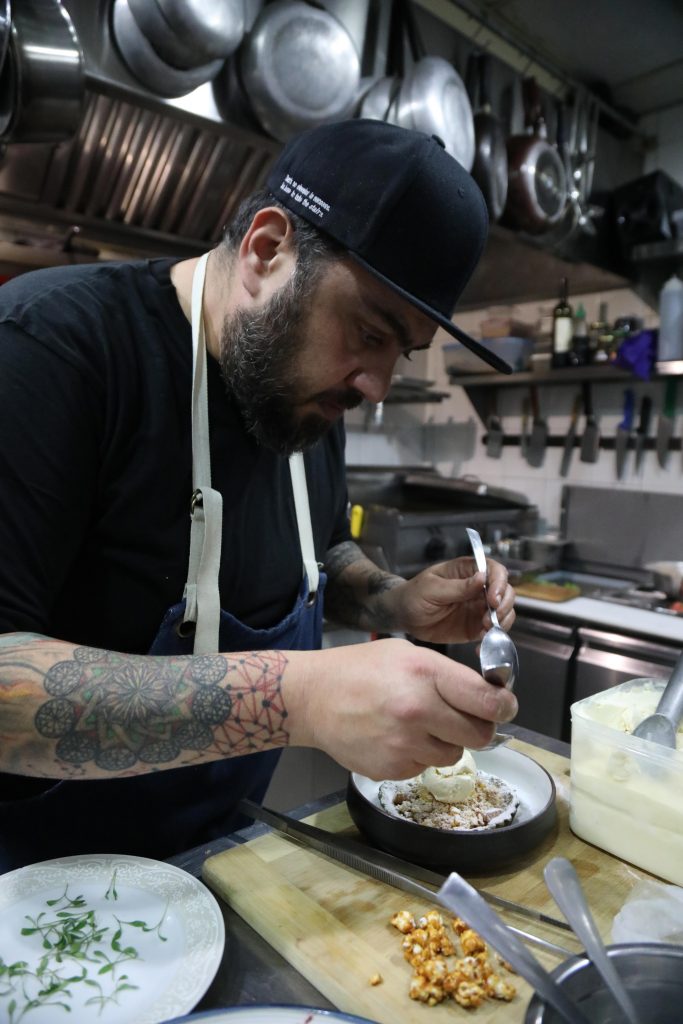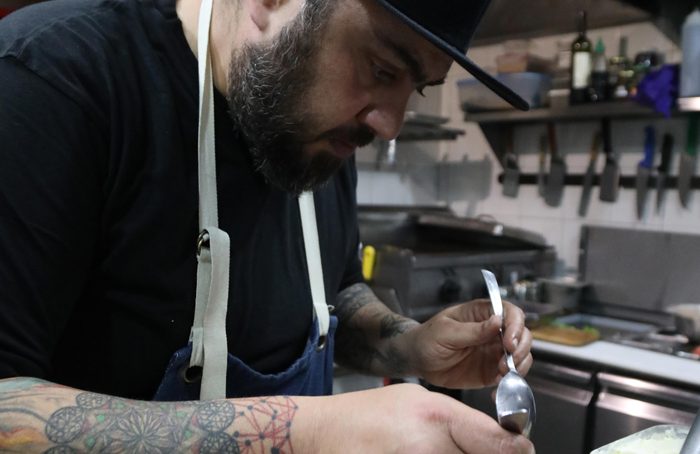
Riad Abou Lteif is a man whose gastronomic journey was initially masked by drawing architectural blueprints for more than a decade before dedicating his life to a childhood passion
What culinary school did you attend?
I believe that every person is a connoisseur when it comes to food. Although I ended attaining an MA in architecture from AUB and worked for 12 years on urban design and town planning projects, my passion from very early on has always been related to my love for cooking. So, when it stopped having fun at work, I turned to the kitchen to feed my true passion.
Do you ever apply what you learned at university in the kitchen?
The techniques I learned help me in the plating process, especially when it comes to applying ‘landscaping’ strategies to dish presentation, which has significantly helped throughout my cooking career thus far. My first project saw me becoming a partner of an Italian restaurant in Beirut, which did not last as the co-founder’s vision and mine did not align. In 2011, after serious talks with Walid Merhi, I joined as co-partner of Ferdinand, a gastropub as head cook and he was co-partner and head bartender. Almost instantly, we noticed that our visions were quite similar highlighted by the fact that there was a unique flow between us. By 2017, in parallel with my work at Ferdinand, I ventured into Meats & Bread, a hardcore open-fire and smoke restaurant pairing various meat cuts with different types of bread.
What was the first manual labor job you took on?
I used to pick, round the age of 15, tomatoes and lemons in the village from whence I came. That was quite an exciting time as we never had to shop for vegetables or fruits.
What is your culinary philosophy?
I believe it all boils down to context, which plays a huge role in everybody’s lives irrespective of the country you come from. This we call, ‘The Food of Lieu’ meaning ‘The Food of the Place’ you find yourself in.
Would you ever consider enrolling in a culinary school?
Not at all since I will learn basic theory, which I can do on my own. Also, I am convinced that I need to learn some very specific things that the academic program may not cover. On the other hand, in pursuit of experience, I learn new things every day.
What is your signature dish?
To answer that would also be limiting, especially with so many influences and cuisines coming into play. Furthermore, saying one dish is more delicious than another is a concept that does not apply for me since in this context, it becomes a matter of personal taste, not skill. That is why, the main target is to find common ground that attracts the flavor profiles that are going to be experienced by the end-user.
So what defines your cooking style then?
It mainly has to be linked to my own philosophy, which, as previously mentioned, reverts back to context. In this case, the food coming out of Ferdinand’s kitchen has to be aligned with the concept this place represents. The food prepared needs to be presented in a certain volume making it easily consumed as well as enjoyed in as little fuss as possible. After all, this is not a restaurant per say.
What are the ingredients you love to work with?
Fresh and often handpicked ingredients, which is something I have been doing for the past three years. I go with my mother-in-law who is teaching me how to forage. In a 15-minute span, you can collect three bags of fresh greens that have a multitude of uses.
What is your favorite kitchen utensil?
A very sharp knife.
Which ingredient do you refuse to work with?
I have none, but what I do not like is disrespecting ingredients. That is why I have great esteem for individuals who know how to extract the unique flavors from every ingredient, even stretching its utility by combining it with other ingredients to further boost or enrich its flavor/use.
If you could execute any F&B concept, what would you introduce and why?
We already are in the process of finalizing a new concept, which we are calling a seasonally-inspired restaurant in the heart of Hamra. Because we believe in wasting as little as possible, we will stretch the use of ingredients and their application to the limit. A typical Baʿal dish would come across to guests as something familiar, yet laden with surprise be it flavors or aesthetics. More accurately, the concept will play on emotions and the use of garnishes. It will be based on a delicate balance of carrying age-old classic traditions using locally-sourced ingredients that do not necessarily fall into a specific cuisine. Another reason why we decided on this concept is because I came to discover that Lebanon has an incredible wealth of produce that is delicious and it would be a shame not to make use of that by offering it to everyone willing to try. This in turn will be in-line with pursuing a healthier lifestyle.
What do you eat on a daily basis?
I have a weakness for thyme and ‘labneh’. The former smells better than it tastes and the latter tastes better than it smells. Pickles, olives and tomatoes are also personal favorites for which I have an affinity.
Do you often travel in search of new foods?
I travel once every two months and eat anything and everything new that comes my way or is served on a plate. This is an approach that allows me to better understand the why and how different or similar ingredients are used. In turn, this leaves less room for failed expectations, which is what all of us in the F&B industry work to meet and even exceed. With the opening of Baʿal come November we intended to achieve that.
facebook.com/Ferdinand.gastropub
Add to Favorites 














